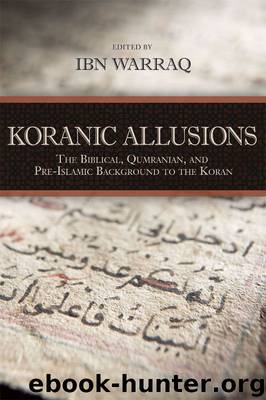Koranic Allusions: The Biblical, Qumranian, and Pre-Islamic Background to the Koran by Ibn Warraq

Author:Ibn Warraq
Language: eng
Format: mobi
Publisher: Prometheus Books
Published: 2013-08-27T06:00:00+00:00
2.2
Some Literary Enigmas of Koranic Inspiration1
A. Regnier
The Koran abounds in passages that make rather overt and often very curious use of the Bible; rare are the books of the Old and New Testament that have no echo in Koranic inspiration, leave no trace in its Arabic expression. However, these traces are almost never in the faithful form of a direct quotation, as in sura XXI, 105, where we read: “And verily We have written in the Psalms [Zabūr], after the Reminder: My righteous slaves will inherit the earth”—these last words in fact come from Psalm 37:29 (“The righteous shall inherit the land”).2 Even here the correspondence is not rigorously exact, however. The Arabic gives us “My servants, the righteous, shall inherit the earth” [Arabic: ’anna l-’ara yariuhā ‘ibādiya l-ālihūna]; the Hebrew Psalm “the righteous will inherit the land” [Hebrew: edīqīm yirašū ’erē]. So we may conceive that the Hebrew text inspired the Koran only through approximate versions and that the linguistic kinship more or less explains the presence on both sides of two identical radicals [stems].
Outside this privileged space, the biblical influences on the Koran are transmitted through implicit and inexact quotations, by general references to the Torah, to the Psalms, to the Gospel, to the Book, through the transformation and often the distortion of stories, scenes, sentences, and proper names. I cannot summarize these parallels here, though Goldziher and others have done so.
But I must insist on the fact that these contacts with the Bible—often operating through different versions, apocrypha, Talmudic and Christian legends, Gnostic and heretical deviations—cannot be explained by conscious, erudite, and writerly composition, which is of, above all, a visual kind. Instead, one must suppose the intervention of a more total psychology, both more alive and more primitive, and then one must accept the possbility of rather unexpected phenomena of an auditory or verbal-motor kind, or else the imaginative and mnemonic fermentation of the subconscious.
Did this elaboration occur principally in the personal mentality of Muhammad? One might accept this hypothesis without excluding secondary sites, if one thinks for example of Umayya b. Abi alt, the Christian poet, or the famous monk Baīrā, or else Waraqa b. Nawfal, the cousin of Khadīja.
Concerning the latter, we read in Ibn Hishām that he was Christian, that he read books, that he had listened to the people of the Torah and the Gospel. And moreover, a hadith related by Bukhārī, according to ‘Ā’isha, states that he made himself a Christian “in the time of ignorance,” was writing the Hebrew book, was writing the Gospel in Hebrew, what Allah wanted him to write. The sense of this passage is undoubtedly that he knew how to read Hebrew writing [Arabic: wa-kāna yaktubu l-kitāba l-‘ibrāniyya] and that he wrote in Arabic based on the Hebrew Gospel; but the meaning of the second part might be also that he was writing extracts from the Hebrew Gospel, or else that he was writing in Hebrew extracts from the Gospel [Arabic: fa-yaktubu mina l-’injīli bil-‘ibrāniyyati]. Despite
Download
This site does not store any files on its server. We only index and link to content provided by other sites. Please contact the content providers to delete copyright contents if any and email us, we'll remove relevant links or contents immediately.
The History of Jihad: From Muhammad to ISIS by Spencer Robert(2621)
Nine Parts of Desire by Geraldine Brooks(2361)
The Turkish Psychedelic Explosion by Daniel Spicer(2355)
The First Muslim The Story of Muhammad by Lesley Hazleton(2268)
The Essential Rumi by Coleman Barks(2043)
1453 by Roger Crowley(2023)
The Last Mughal by William Dalrymple(1855)
Trickster Travels: A Sixteenth-Century Muslim Between Worlds by Davis Natalie Zemon(1847)
Muhammad: His Life Based on the Earliest Sources by Martin Lings(1644)
God by Aslan Reza(1639)
by Christianity & Islam(1628)
A Concise History of Sunnis and Shi'is by John McHugo(1567)
No God But God by Reza Aslan(1540)
Magic and Divination in Early Islam by Emilie Savage-Smith;(1533)
The Flight of the Intellectuals by Berman Paul(1501)
Nothing to Envy by Barbara Demick(1445)
Art of Betrayal by Gordon Corera(1429)
What the Qur'an Meant by Garry Wills(1391)
Getting Jesus Right: How Muslims Get Jesus and Islam Wrong by James A Beverley & Craig A Evans(1340)
